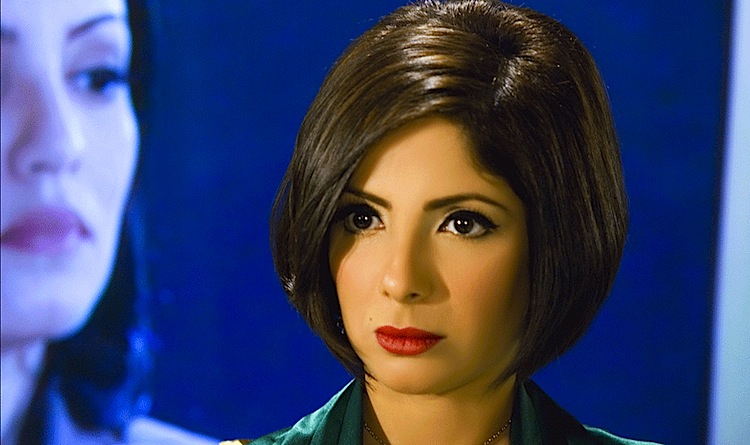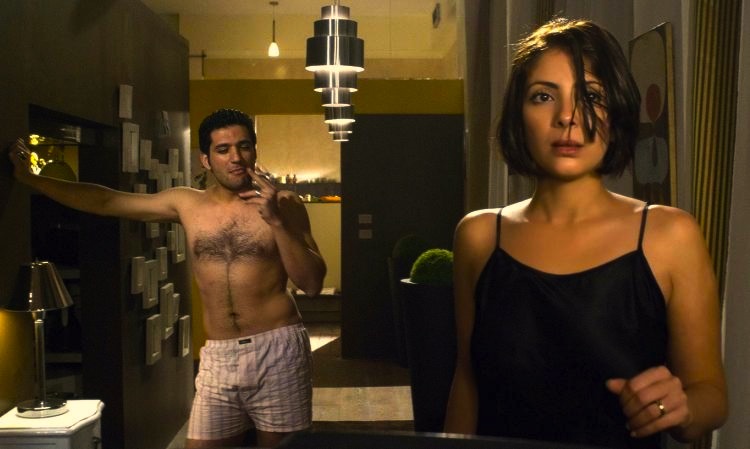
By Joe Bendel. Hebba Younis wants to be Chris Wallace. Her husband wants her to be Oprah Winfrey. However, when at his behest she temporarily forgoes her hard-hitting newsmaker interviews in favor of women’s interest features, it winds up antagonizing the Egyptian government even more in Yousry Nasrallah’s Scheherazade, Tell Me a Story (trailer below), a recent selection of the Venice Film Festival which has its New York premiere during this year’s African Diaspora International Film Festival.
They should be Cairo’s most fearsome media couple. Younis is the formidable host of a morning talk show. Karim Hassan is an up-and-coming journalist in line to become editor-in-chief of one of Egypt’s state-owned newspapers. Unlike Younis though, Hassan never met a government official he wouldn’t suck up to. Reluctantly, she agrees to lay low during the upcoming editor selection process. Yet, as she invites average Egyptian women on her show to tell their stories, a portrait of a corrupt and misogynist Islamic society emerges that hardly thrills Hassan. When cabinet ministers start to be implicated in her guests’ stories of victimization, we know there will be trouble.

Essentially, Scheherazade is four films in one, telling three discrete story arcs in flashbacks within the framework of Younis’ show. As the least controversial (and therefore least memorable), her first interview with a late middle-aged volunteer social worker gives Hassan reason for hope. While it runs a bit long, the second woman’s story is a much different matter. Convicted of murdering the man who was playing her and her two spinster sisters, it raises hot button questions about women’s legal rights in Egypt specifically and under Islamic law in general—not exactly territory Hassan and his political masters are eager to explore. When Younis’ third guest Nahed, a dentist from a prominent family, accuses a sitting minister of sexually and financial preying on mature unmarried women, all bets are off.
While cinematographer Samir Bahsan gives Scheherazade a lush, sophisticated look, it is a surprisingly tough film. Though Hassan might appear to be a modern dope-smoking yuppie, it becomes clear he would prefer his wife veiled and cloistered rather than more famous than him. Evidently, Mona Zaki has been the target of some heated disparagement from Egypt’s medieval quarters for her portrayal of the relatively liberated and assertive Younis. While she is a smart and attractive lead, Sanaa Akroud really steals the picture as Nahed, an older but still striking and all too vulnerable woman. Akroud brings out her intelligence and resoluteness, making her not-so uncommon circumstances a particularly effective indictment of Islamist Egypt.
Scheherazade would be bold for any Islamic country and is especially so in an Egypt where most media is wholly owned by the Soviet-sounding State Information Service. A feminist film in the best sense of the term, Scheherazade is a surprisingly forthright look at the status of Egyptian women today. Timely and recommended, it screens as part of the 2010 ADIFF at the Anthology Film Archives on Sunday (12/12) and next Tuesday (12/14, the concluding night of the festival) at Symphony Space’s Thalia Theater.
Posted on December 6th, 2010 at 10:12am.
One thought on “Women in the Islamic World: Scheherazade, Tell Me a Story”
Comments are closed.